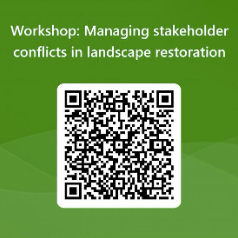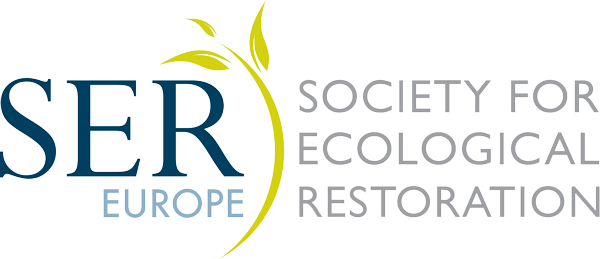Workshops on
August 25, AUGUST 28 & August 31
1. Workshop: Remote sensing-based monitoring of peatlands and their restoration
Organizer(s): Parvez Rana, Natural Resources Institute, Finland
Date: 25 August 2024
Time: 9:00-12:00
Location: Oecologicum (Liivi 2, Tartu - GOOGLE MAPS)
Max number of participants: 15
Fee: 30 EUR
This workshop offers an introduction to how remote sensing has been used and can be used to monitor changes in peatland ecosystems, particularly after restoration actions. Participants will get acquainted with the latest advances in remote sensing techniques and peatland restoration. Attendees will gain a deeper understanding of how remote sensing contributes to environmental research, conservation efforts, and policy-making.
2. Workshop: Accelerating wetland restoration, conservation, and sustainable management - Empowering stakeholders to find new means and ways to deal with the current challenges
Organizer(s): Lisa Wiatschka, Bax & Company; Vanessa Ferreira, IDENER
Date: 25 August 2024
Time: 9:00-11.00
Location: Oecologicum (Liivi 2, Tartu - GOOGLE MAPS)
Max number of participants: 40
Fee: no fee
The REWET project will facilitate the sustainable restoration and conservation of wetlands in Europe through an extensive analysis of policy frameworks and innovative methodologies to involve local stakeholders in the decision-making process.
This interactive workshop aims to bring together different stakeholders (Open Lab practitioners, scientists, politicians, businesses and investors) to discuss current challenges/bottlenecks, and opportunities around wetland restoration. The workshop will help shift perspectives through an engaging role-play exercise, where stakeholders will have to step in other’s shoes to understand their perceptions, drivers and barriers. The final goal is to draw up potential new business model types for the sustainable management of wetlands which benefit both people and nature.
3. Workshop: Is Harmony Possible in Restoration: Resolving Conspiracy Theories and Dispelling Myths in Ecological Restoration
Organizer(s): Mari Palolill, Estonian Fund for Nature, Estonia
Date: 25 August 2024
Time: 14:00-17:00
Location: Oecologicum (Liivi 2, Tartu - GOOGLE MAPS)
Max number of participants: 20
Fee: 20 EUR
Is harmony between various land use interests a myth itself in ecological restoration or can it be achieved with proper tools and methods? The objective of this workshop is to map the common myths, conspiracy theories and arguments against ecological restoration in Europe. Furthermore, we aim to dig deeper with workshop participants to understand the driving forces behind those myths and conspiracies that lead to conflict.
4. Workshop: Co-creating a European Science Service for Freshwater Biodiversity
Organizer(s): Kata Fodor & Karmen Czett, Environmental Social Science Research Group (ESSRG); Twan Stoffers, Leibniz Institute of Freshwater Ecology and Inland Fisheries (IGB)
Date: 25 August 2024
Location: Oecologicum (Liivi 2, Tartu - GOOGLE MAPS)
Time: 14:00-16:00
Max number of participants: 30
Fee: no fee
Addressing freshwater biodiversity loss requires the integration of diverse social perspectives into policy-making. BioAgora is organizing a workshop to co-design the governing principles of the future European Science Service for Biodiversity (SSBD). Using a design thinking approach, participants will simulate interactions among diverse stakeholder roles, including researchers, hydropower companies, local communities, and NGOs. Participants will reflect on their experience, discuss pros and cons of participation, and explore tools for inclusive decision-making. The goal is to refine the SSBD's governing principles, ensuring that it effectively bridges knowledge and policy while empowering a broad range of stakeholders for freshwater biodiversity protection.
5. Workshop: Co-designing a marine restoration toolbox with the Mission Ocean project CLIMAREST
Organizer(s): Ida Beathe Øverjordet (SINTEF Ocean) and Fedra Herman (SERE)
Date: 28 August 2024
Location: Estonian National Museum (ERM) - GOOGLE MAPS
Time: 13:00-15:00
Max number of participants: 30
Fee: no fee
The CLIMAREST project develops a digital toolbox to enhance the efficacy of marine ecological restoration. This workshop will engage the marine community to co-design the toolbox and contribute to maximising the impact of Mission Ocean. Designed for experienced practitioners, experts, and scientists, the event will include the toolbox presentation, a round-table dialogue, and open discussions. Key topics encompass current tools, their effectiveness, and strategies for collaborative success in reaching Mission Ocean targets, ensuring the workshop is a dynamic forum for advancing restoration actions. Which tools are you using? What are you missing?
Join us and contribute to restoring our Ocean!
6. Workshop: Urban biodiversity friendly practices and biodiversity monitoring in Tartu city
Organizer(s): Elin Sild, University of Tartu
Date: 31 August 2024
Location: Oecologicum (Liivi 2, Tartu - GOOGLE MAPS)
Time: 9:00-13:00
Max number of participants: 20
Fee: no fee
The aim of the ongoing urbanLIFEcircles project in Tartu is to increase biodiversity in the city, create a network of interconnected green areas, mitigate the effects of climate change and create a good living environment for everyone. In cooperation with the communities of Tartu, the urban environment is transformed into a better habitat for both urban nature and people. This workshop will present lessons learned from shifting to more biodiversity friendly maintenance in urban settings and methods for mapping urban biodiversity.
7. Workshop: New indicators for genetic diversity and how their application can aid ecological restoration
Organizer(s): Linda Laikre, Stockholm University; Philippine Vergeer, Wageningen University; Filippos A. Aravanopoulos, Aristotle University of Thessaloniki
Date: 31 August 2024
Location: Oecologicum (Liivi 2, Tartu - GOOGLE MAPS)
Time: 10:00-15:00
Max number of participants: 20
Fee: no fee
This workshop focuses on exploring how newly developed indicators for genetic diversity can aid in ecological restoration. Genetic diversity is critical to all biodiversity because it provides the basis for populations to genetically adapt and survive in rapidly changing environments. Maintaining and restoring genetic diversity is key for successful biodiversity conservation. The Convention on Biological Diversity puts increased focus on genetic diversity in its new Global Biodiversity Framework from December 2022. To support the implementation of this framework new indicators have been developed and are being tested. We will present the indicators and discuss their relevance for ecological restoration.
13.0 Workshop: Exploring Multi-faceted Approaches to Landscape-Scale Restoration
Organizer(s):
Sebastian Birk — University of Duisburg-Essen
Susana Bautista — University of Alicante
Anushree Bhattacharjee — UN Environment Programme World Conservation Monitoring Centre
Pål Martin Eid — SWECO Norway
Billy Fairburn — BirdLife International
Virgil Alexandru Iordache — University of Bucharest
Nancy Ockendon — University of Cambridge
Vanessa Ospina Lopez — BirdLife International
Taylor Shaw — University of Cambridge
David Thomas — University of Cambridge
Jasper Van doninck — University of Twente
Alejandro Diaz - Commonland Foundation
Date: 30 August 2024
Location: at the venue (part of the programme), Manninen room
Time: 10:30-12:00
Building on the insights and discussions from the individual sessions regarding the landscape restoration held the previous day (13.1-13.5), this workshop aims to consolidate and expand upon the strategies for effective landscape-scale restoration. Participants can choose to join small groups, each delving into one of four critical themes:
- Stakeholder Engagement: Discuss methods for creating a cohesive landscape vision that includes the diverse needs and perspectives of all stakeholders. Explore strategies for meaningful and effective participation of local communities in designing restoration policy and implementation at the landscape scale?
- Implementing and Monitoring Restoration: Identify major challenges in implementing and measuring the impact of restoration at a landscape scale, such as knowledge gaps and technological limitations. Examine cutting-edge approaches and techniques for data collection, impact assessment, and communication of results.
- Financing Restoration: Explore innovative financing models to address the challenge of insufficient funding for landscape and seascape restoration in Europe. Consider the role of public-private partnerships and other novel funding mechanisms in sustaining restoration efforts.
- Supporting Restoration through Livelihood Generation: Investigate how communities that manage landscapes and seascapes can benefit from nature-based tourism and recreation. Discuss equitable benefit-sharing mechanisms and capacity-building strategies to support sustainable livelihoods.
Each group will present their synthesized findings, highlighting key insights, innovative solutions, and potential action steps. The session will conclude with an open floor discussion, encouraging cross-theme interaction and collaborative learning. A summary of key takeaways and proposed next steps will provide a roadmap for ongoing collaboration and action. This synthesis workshop offers a unique opportunity to integrate diverse perspectives and approaches, fostering a comprehensive understanding of landscape-scale restoration.
13.3B Workshop: Managing stakeholder conflicts in landscape restoration
Coordinator(s): ELSP Stakeholder Engagement Task Force – Convening for Restoration project
Date: 29 August 2024
Location: at the venue (part of the programme), Maailmafilm room
Time: 16:30-18:00
Restoration at large scale usually involves different types of ecosystems that are used and valued in multiple ways by a diversity of stakeholders, depending on their interests and historical-cultural relationships. Sometimes, restoration actions might raise disagreements and conflicts between groups over different issues, for instance, on how sites should be restored and managed, the distribution of the costs and benefits, sharing of rights and responsibilities, territorial inequalities and power imbalances, and the differing visions about the landscape/seascape. There might also be a lack of understanding on how to transition to more sustainable practices of land use such as agroforestry, sustainable fisheries, etc. Recognising these diverse views and addressing disagreements is crucial for successful restoration processes. While perceptions of conflict are often negative, they sometimes provide opportunities to build a common understanding of others’ views and a shared vision for the future.
The aim of the workshop is to exchange on positive and challenging experiences, along with lessons learned on how to manage conflicts between stakeholders effectively and fairly, and how to transform (if possible) different stakeholders’ interests and competing claims into shared visions. This workshop is led by the ELSP Stakeholder Engagement taskforce, and it follows the session 13.3A Equitable and effective stakeholder engagement and co-produced solutions in landscape restoration, co-led by the University of Alicante and the Task force. The workshop would pick up key messages from the session to continue and expand the discussion on conflict management. The key learnings will be incorporated in a good practices output for restoration practitioners. The Task force will aim to remain in contact with the participants (if they wish) for further contributions to the outputs.

13.5B Workshop: Unlocking private finance for ecosystem restoration
Coordinator(s): Anushree Bhattacharjee, UNEP-WCMC; Rodrigo Cassola, UNEP-WCMC; and Giacomo Ascenzi, UNEP-WCMC
Date: 29 August 2024
Location: at the venue (part of the programme), Manninen room
Time: 16:30-18:00
Insufficient restoration finance is identified as one of the key barriers to scaling up restoration across Europe. The Convening for Restoration project, funded by the Endangered Landscapes & Seascapes Programme (ELSP) was launched to help address some of these key barriers for scaling up restoration including the critical one of inadequate finance. The project aims to strengthen the dialogue between the various sectoral actors needed to ensure successful scaled-up restoration, such as the conservation community, restoration practitioners, local communities, the finance sector, and policymakers.
Under the project, a dedicated ELSP Finance for Restoration Taskforce has been established (led by UNEP-WCMC) with the focus of exploring opportunities, challenges, as well as the risks of increasing the flow of private and potentially blended finance into ecosystem restoration in Europe. This convening workshop is being organised by the finance taskforce members to brainstorm with key stakeholders from diverse sectors to start co-creating a playbook for restoration project developers across Europe to better access increased private financing. The workshop will particularly focus on capturing lessons and best practices on improving the financial attractiveness of restoration projects for private sector funding and closing gaps in capacity and knowledge for accessing private finance.
The Taskforce will aim to continue engagement with the workshop participants post the workshop in order to continue co-creating the workshop outputs.
Interested participants are requested to please register their interest through the below link or QR code:
https://forms.office.com/e/Jr3anM63kp
OR







